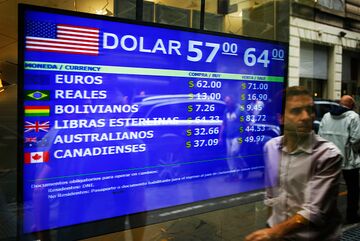Economics
Could Dollarization Be Argentina’s Salvation?
After eight defaults, it needs a currency that it can’t print, game or otherwise defile.
Peronist leader Alberto Fernandez and his deputy, former president Cristina Fernandez de Kirchner, won a commanding victory over center-right incumbent Mauricio Macri in Sunday’s poll. But for a nation that has defaulted eight times on its debt and spent a third of the last seven decades in recession, the path forward is unclear.
Voters clearly said no to another mandate for Macri, who promised foundational reforms through managerial nous, and delivered sacrifice and half-measures instead. Nor will Argentinians or the financial markets, upon whose good graces this nation of 45 million depends, abide a return to the interventionism that marred Fernandez de Kirchner’s 2007-2015 government – one reason perhaps that she took second chair to her more conciliatory namesake. (They are unrelated.)
If there is any consensus, it’s that more of the same will not do. But here is where the conversation could get interesting. To a growing number of respected economists, the only path to a fresh start for Argentina involves embracing the U.S. dollar.
The details of dollarization are vexing: Who will be the lender of last resort? How to manage the vagaries of trade and the business cycle when you can’t set interest rates or calibrate the exchange rate? Yet the argument for the greenback is straightforward. When a nation has lost its grip, its currency tumbles, credit risk spikes and bonds fall. If conventional monetary and fiscal policy fails to stabilize the economy, the crisis returns again and again. Better to ditch the iffy peso for the greenback, that reliable Latin American mattress-stuffer, which native authorities cannot print, game or otherwise defile.
Yes, dollarization is the monetary nuclear option. That may be why by 2002 only some 35 countries worldwide, most of them small, had officially given up their own currencies for the dollar. Ecuador is the largest of the three Latin American dollarizers (alongside El Salvador and Panama) and its gross domestic product is just one-fifth that of Argentina.
Serial bouts of hyperinflation, overspending and foreign indebtedness have taken their toll. Each crisis has caused the peso (one of this year’s worst-performingcurrencies) to collapse, destroyed trust in policymakers (who’ve now returned the favor by tightening capital controls), and made the country a perennial pariah in the credit markets (Argentine bonds slumped again on Monday). Tellingly, lenders took heart in the narrower-than-expected Peronist victory, a sign perhaps that Argentinians want stability, not adventure.
Dollarization has its discontents. Not everyone agrees that the best way to restore economic integrity and trustworthiness is to take away policy command and control. Argentinians experimented with dollarization in the 1990s through a policy called convertibility: Each peso was legally backed by a dollar in reserves at a fixed one-to-one exchange. It worked for a while, but there was leakage. Provinces found loopholes to federally mandated austerity, fiscal profligacy continued and even with the dollar anchor, the central bank kept tinkering, therefore undermining convertibility and setting up the country for its seventh debt default since 1827.
And yet at some point, governments exhaust their quota of mistakes. Alberto Ramos of Goldman Sachs is no fan of dollarization, but he allows that dire circumstances call for extreme measures. “If you continue to go from crisis to crisis, you have to let go and dollarize,” he told me. By now, Argentina may well have erased the ifs.
Discarding dollarization because it ties a nation’s hands and deprives a government of instruments to manage exchange rates and business cycles sounds sensible, but ultimately rests on a conceit that ignores events on the ground in Argentina. Economist Nicolas Cachanosky, of the Metropolitan State University of Denver, calls this the nirvana fallacy. “Argentine economists tend to confuse the possible with the probable. They imagine a well-functioning central bank that carefully considers and implements policy. But experience suggests something far less desirable will result,” Cachanosky recently wrote.
What’s not in dispute is that Argentina long ago breached the threshold of economic normalcy. “Argentina lacks credit in the broadest sense; it is a zero-trust country,” writes Johns Hopkins University economist Jorge C. Avila, who along with Cachanosky is one of the few Argentine enthusiasts of dollarization.
In a study earlier this year Avila argued that dollarizing could work as long as Argentina opens its air-gapped economy (exports and imports amount to only about 30% of gross domestic product). “Dollarizing with financial integration and free-trade agreements with superpowers will bring a degree of monetary and financial stability not seen by this country in a century,” he wrote.
That may sound overly optimistic. Indeed, going all the way and scuttling a national currency is a dire recourse, and likely unthinkable for the new Peronist management, whose standard bearers spent much of the campaign blaming Macri for turning Argentina into a vassal of the International Monetary Fund. “Dollarization is a one-way street, you don’t go back,” said Monica de Bolle, a senior fellow at the Peterson Institute for International Economics.
As it happens, de Bolle added, Argentinians are way ahead of their political establishment. Each crisis has led them to dump pesos for the greenback, the only medium of exchange that counts for real estateand other big-ticket transactions. Argentinians have squirreled away up to $150 billion in cash and hold an estimated $500 billion in assets abroad. “Argentinians think in dollars, plan in dollars, dream in dollars and have nightmares in dollars,” said Ramos.
What the Peronists need to say is, if Argentina doesn’t dollarize, then what? The options are all but spent.
This column does not necessarily reflect the opinion of the editorial board or Bloomberg LP and its owners.



Nenhum comentário:
Postar um comentário